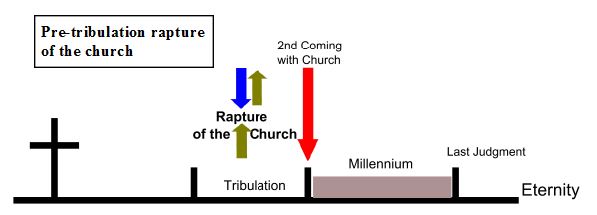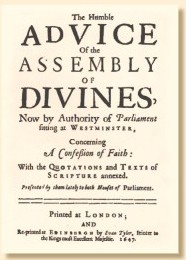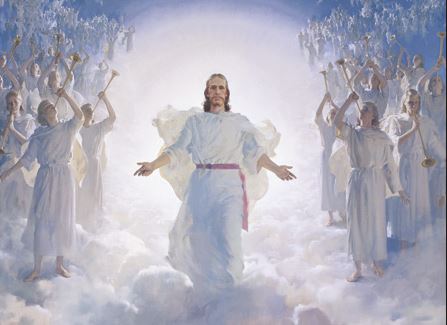 Related Articles
Related Articles
|
|
|
 Websites
Websites
|
|
|
|
|
Covenant Theology and Dispensationalism
Two contradictory and competing 'systematic theologies' have been, and remain very influential in shaping Christian belief and action.
 Note: The 'response' facility relating to this article is available to (logged on) site members only. Note: The 'response' facility relating to this article is available to (logged on) site members only.
Preface
The following article is a modified extract from an earlier article entitled 'A Covenant-keeping God'. The piece, which contains an overview of the major Biblical covenants, is itself part of a 'Drilling Down' series of articles (a 'work in progress').
-----------------------
Foreword:
Theological constructs;
frameworks of interpretation
(aka Systematic Theology)
REGARDING interpretational systems and frameworks or – to use the fancy term – hermeneutics, it is important to note the distinction between terms which are ‘theological’ and those which are ‘biblical’. Theological terms need to be treated with great caution.
Whilst these might be convenient in the discussion of key biblical themes and concepts (e.g. the term ‘Trinity’ as used in reference to the triune Godhead) these are essentially – in the grand sweep of history – neologisms.
They are essentially religious rather than biblical terms or, to use another word, ‘inventions’. They are often lacking clear definition and, across the Christian spectrum, experience differing levels of (dis)agreement and common understanding.
An example is the word ‘sacrament’. It is not found in the Bible and theologians have differed regarding the precise nature of a ‘sacrament’ and also what is (and isn’t ) covered by the term. (See New World Encyclopedia on the subject.) And the different opinions are not confined to the clichéd Roman Catholic/Protestant divisions. The Reformers Luther and Zwingli were famously in disagreement over Communion.
It is also important to differentiate between inductive learning and deductive reasoning. The former derives a view directly from (out of and formed by) the Bible text (exegesis): the latter is arrived at by a process of logic. For instance (and only for the sake of illustration) if it is held that God predestines some to salvation, then logic should dictate that God must, by extension, predestine some to a lost eternity. The use of logic can produce doctrines that are arrived at by eisegesis (reading into a Bible text from a particular and pre-suppositional theological framework).
Clever murder mysteries use 'deduction' to lead the reader or viewer on a false trail and to suspect the wrong person of the crime. (But of course Hercule Poirot's incisive and 'out-of-the-box' thinking shames the logic of we armchair sleuths every time.)
This is not to detract from the benefits of Systematic Theology which (in plainer language) is merely a themed approach to Bible study, but rather to highlight that theological suppositions should never be placed on a par with or, infinitely worse still, sit above the Word of God.
------------
Introduction
Two major theological systems -
(which contradict each other whilst also failing the Berean test: Acts 17:10-11).
 Caveat: Whilst focusing on particular interpretations, this is an 'equal opportunities' document in that it offers scope for a variety of opinions right across the theological spectrum. Caveat: Whilst focusing on particular interpretations, this is an 'equal opportunities' document in that it offers scope for a variety of opinions right across the theological spectrum.
In the Christian community across the world there are a variety of theological positions. However two of these have gained widespread support and – whilst disagreeing with one another – have both been highly influential in the formulation of belief. And it is important to stress again that these are theological constructs. The earliest of the two has been termed ‘Covenant Theology’ (mainly formulated and codified in the 17th century; see Footnote): the other being ‘Dispensationalism’ (with its origins in the 19th century).
The former is a central plank within Presbyterian churches around the world and across the (Presbyterian) denominational spectrum. The latter originated in the UK (pioneered by those within what became the Plymouth Brethren), but crossed the Atlantic to become hugely influential in the late 19th century. Dispensationalism informed the belief of the pentecostal churches at the start of the 20th century and has, since then, expanded both denominationally and geographically.
Covenant Theology

Covenant Theology (CT) developed two principal terms to describe its dual covenant interpretational framework viz. a Covenant of Works and a Covenant of Grace. (Some argue that there is only one covenant – the Covenant of Grace. Others include a Covenant of Redemption between the Father and the Son.) These theological terms have been employed to develop a whole range of doctrines and, because of the influence that they have had, we will (d.v.) come back to these later in more detail.
However, for the moment, and with reference to the most common 'dual-covenant' view – developed first by Dudley Fenner, an English Puritan, in 1585; and then Scottish theologian Robert Rollock (1555 - 1598) – it is sufficient to say that the (theological) Covenant of Works is used to denote the period prior to the Fall in the Garden of Eden. In simple terms the Covenant of Works would say: “If Adam and Eve had obeyed the instructions given to them then they would have been OK. “ However Adam and Eve didn’t, so God had to embark on Plan B – the Covenant of Grace.”
This term – again simply speaking, but remembering that it is a theological expression, not a biblical, one – covers the continuous period from the Fall until the final consummation and Kingdom come.
However this span of time is (it is argued) should be split into two ‘administrations’ (again a non-biblical term); basically delineated by the Old Testament (OT) and the New Testament (NT) periods. In these two ‘administrations’ (it is said) God applied the same principles but in two different situations and in two different ways to the one people of God. These were Israelites in the OT and believers (Gentile and Jewish) in NT times.
Whilst this is a convenient hermeneutic, it is not biblical. The nation of Israel was in effect a theocracy within which some were in communion with God (cf Heb. 11) while others very obviously, were not. In contrast the church (in the true sense of the bride of Christ) comprises solely of people in blood-bought communion with God.
So 'OT Israel = OT expression of church' is both overly-simplistic and grossly misleading . As a corollary, 'Church = Israel' is also untrue. (More on this below.) But as Covenant Theology has been widely accepted as ‘biblical’ it has led directly to (for instance) infant baptism. Accordingly paedobaptism is claimed to be the NT equivalent of circumcision – even though circumcision was never the symbol of salvation and union with God; and was only ever applied to males. [Again, more on this at later date (d.v.) when looking at 'Who are Abraham's seed?']
One of the other principal, and even more serious, mistakes deriving from Covenant Theology has led to what is commonly called ‘Replacement Theology’. This ‘theology’ – also termed Supercessionism – teaches that the Jews have now been ‘replaced’ by the mainly-Gentile church and (therefore, by deduction and logic) the promises to the Jews have now either all been fulfilled or spiritualised; or will find any contemporary or future fulfillment in the church. (So for instance many older Bibles have chapter headings for Isaiah 59 as “God’s curses on the Jews” and Isaiah 60 as “God’s blessings on the Church”.)
The ‘replacement’ view is most emphatically rejected by Paul in his letter to the (Jewish and Gentile) church at Rome. In fact this is his core message (Rom 11:1-2; 11-12) and the underlying reason for writing this – his longest – letter.
Dispensationalism

In contrast to Covenant Theology the other system of interpretation that has attracted widespread support is that of Dispensationalism.
There is a view that Dispensationalism (as distinct from, but embracing pre-millennialism) has its genesis in a Scottish believer (Margaret Macdonald; 1815-1840) and a Church of Scotland minister (Rev. Edward Irving; 1792-1834). What is undisputed is the fact the John Nelson Darby (founder of the Plymouth Brethren as a distinct grouping with its roots in the wider Brethren movement) is the latter-day father of this theological system. Darby took his pre-tribulation rapture teachings (the removal of believers from the earth prior to the return of Christ and before the ‘great tribulation’ of Matt. 24) to America where they were enthusiastically embraced by a lawyer called Cyrus I. Scofield (1843-1921).
Scofield in turn produced the Scofield Reference Bible (first published 1909) which is annotated throughout in support of Darby’s interpretations – especially with reference to eschatology, the end-time prophecies and events regarding Christ’s return. The Scofield Bible has been hugely influential right through to the present day – in America and right around the world. The teachings are now being propagated through the Moody Bible Institute in Chicago, Dallas Theological Seminary, and more than 200 other lesser-known Bible institutes..
Dispensationalism divides history into sections, covering the periods of Innocence, Conscience, Civil Government, the Patriarchs, the Law, Grace (the church age), the Millennium and the final consummation leading to the everlasting kingdom. However, and perhaps because this theological system lacks biblical warrant, there is a range of opinions (disagreement) on how many dispensations there are (varying from three to eight) and where, in history and in Scripture, the dividing lines lie.
But irrespective of the number of dispensations, the agreed assumption is that God has dealt differently with his world and its people in each of these different dispensations. Accordingly then, a different hermeneutic needs to be applied to the different portions of Scripture which cover these different periods of time.
What is also generally agreed is that the church age is a parenthesis – a defined interlude – in God’s overall plan of salvation i.e. in the OT God is dealing through the Jews while the NT is the time of the Gentile church until Jesus’s rapture of the saints (with a pre/post/mid-Tribulation rapture range of views) . This will usher in a further period of God again dealing with and through the Jews.
Dispensational teaching has been greatly popularised and adopted through hugely-influential and best-selling books like Hal Lindsey’s ‘The Late Great Planet Earth’ (1970) and the ‘Left Behind’ series of novels by Tim LaHaye. The Left Behind books – the first in the series appeared in 1995 – have sold over 50 million copies, and have been turned into a cinema production. The books are freely available from and often prominently displayed in Christian bookshops.
As stated earlier, the core element of these novels is the ‘pre-tribulation rapture’ which, as already stated, teaches that all Christians will be suddenly and without any warning removed from the earth prior to the return of Christ. (See Footnotes.) However, and apart from the wider Christian community, even within the Brethren camp there was disagreement. George Mueller (of Bristol Orphanage fame) broke with Darby over this issue. The great Baptist preacher C.H. Spurgeon also declared the teaching to be unscriptural. Nevertheless the doctrine has persisted.
In summation...
Both Covenant Theology and Dispensationalism have been and continue to be highly influential in formulating Christian belief, but both are disputed.
Covenant Theology dismisses swathes of end-time prophecy as irrelevant or allegorical, and sees no place in God’s final purposes for the Jews other than (perhaps) a final ingathering as outlined in Romans. In terms of latter-day expectations prior to the return of Jesus, the former implicitly teaches a universally positive response to the Gospel (reading more into Matt. 24:14 than the verse allows; cf Matt 7:14).
Meanwhile, though recognising the prophesied 'time of great trouble' (Dan 12:1; Matt 24; 2 Tim. 3:1-12), Dispensationalism (in pre-tribulation rapture form), teaches that believers will be spirited away, leaving the Jews to face the music of Satan’s final onslaught. (See Footnotes.)
So while the Gentile believers look down from a safe vantage point in heaven (as God's 'heavenly people'), the Jews will be God's latter-day 'earthly people' who will suffer greatly but endure through the Great Tribulation. Within the Dispensationalist view, Matthew 24 (et al) and, for some, Revelation chapters 4 - 19 are seen as only of academic interest – given the belief that the Gentile saints will be in heaven during that period.
Regarding God’s end-time purposes for the Jews, Dispensational Theology cannot get the church and Israel together, whereas Covenant Theology cannot get the church and Israel apart. The former sees the Jews and the church as totally different entities separated by ethnicity and end-time progression, whereas the latter see Israel and the Jews as essentially an earlier expression of the church, differentiated only by two separate and distinct ‘administrations’ of time (OT/NT) in God’s grace. In fact Israel was/is a physical nation comprising the saved and the lost (Rom 9:7), whereas followers of Christ are a spiritual nation made up exclusively of the redeemed (Gal 3:7,8; 1 Pet 2:9).
At the very least it can be confidently stated that because these two systems disagree markedly with one another, they cannot both be completely right. (And it could be argued that in critical issues they are both wrong.) Yet both of these systems have created expectations and assumptions which could leave believers scripturally askew; vulnerable through false hopes; and ill-prepared to understand the times and the purposes of God in our day as the cosmic upheavals preceding Kingdom Come drawn ever nearer.
At the risk of vain repetition, the theological systems of Covenant Theology and Dispensationalism lack Biblical support in major areas of doctrine, theology and eschatology. Moreover they profoundly disagree with each other on very significant points – especially concerning the times preceding the coming again of Christ; the place of, and God’s purposes for the Jewish people; and the establishment of His everlasting kingdom.
Footnotes:
1. Pre-Tribulation Rapture of the church as taught by most Dispensationalists. The view held is that Christ will have two comings: the first will be invisible 'for the saints' and the second 'with the saints'.

-------------------
 2. The Westminister Confession of Faith (1644) codifies much of what is described as 'Calvinism' and is subscribed to as a 'Subordinate Standard' by Presbyterian denominations worldwide. 2. The Westminister Confession of Faith (1644) codifies much of what is described as 'Calvinism' and is subscribed to as a 'Subordinate Standard' by Presbyterian denominations worldwide.
The document is predicated on so-called 'Covenant Theology' and contains material which is, in the broad sweep of the formulation Biblical, extra-biblical, and unbiblical representing Truth mixed with error.
It is also deficient in failing to cover some some major biblical themes: making bare mention of the person and role of the Holy Spirit, and with no mention of the Great Commission.
3. The Millennium
 Broadly speaking Reformed (Covenant) theology teaches the Millennium as being a definite period prior to the coming again of Christ at the end of the age. However, the early church believed in a literal Millennial reign of Christ on earth. Broadly speaking Reformed (Covenant) theology teaches the Millennium as being a definite period prior to the coming again of Christ at the end of the age. However, the early church believed in a literal Millennial reign of Christ on earth.
While many today share this latter view, not all who do are Dispensationlists (i.e. all Dispensationlists are pre-millennial but not all Pre-Millennialists adhere to Dispensationalism). See article The (Coming) Millennium by a Scottish lay preacher and city mission superintendent. |
The Editor, 30/07/2013
|
(page
1
2
3
4
5
6
7
8
9
10
11
12
13)
| |
|
Editor |
18/08/2013 19:53 |
Regarding 'Reformed Baptists' and Covenant Theology,in my experience the former are more Calvanistic than many adherents of CT. (I know of one RB church which left the unconverted husband of a believing church member to "stand in the corner" of the church meeting - leaving it to the Lord's predestined purposes as to whether or not he comes to know the Saviour.)
I don't think I said that it was only paedobaptist churches which supported CT. The Reformed Baptist are, I think, 'CT except baptism'.
I think you have said that you yourself are 'CT except eschatology'. And here, as you have rightly pointed out, is one of the difficulties of 'labels' i.e. there are variants within any one grouping.
But let's get back to the core issue of CT rather than Reformed Baptist behaviour and baptism.
|
| |
|
Colin Ford (Guest) |
19/08/2013 21:21 |
I couldn't comment on the latest headline page on your website, as there was no provision to do so.
David Pawson's beliefs regards eschatology are, I would say perfectly in line with what I believe the Bible to teach. He has been studying the Bible for more years than I care to mention, and in the time that I have been studying God's Word regards end times ( about 7 years); I agree with him that Dispensational theology is errant and that there will be NO secret, any moment or imminent rapture, it IS plain and simply a delusion, and we should NOT be afraid to describe it thus.
Editor, I have mentioned before that I am "CT without eschatology", and I stand by that statement because I believe that "law and grace" was in the garden before sin.....
|
| |
|
Jack |
19/08/2013 22:47 |
Quote from Colin:I believe that "law and grace" was in the garden before sin.....
Indeed - the positive must always precede the negative - otherwise the negative can have no relevence.eg murder has no relevance or reality separated from the life which it has extingished.
Regarding David Pawson: the first tape of David's whichI listened to was based on his 'strong dislike' of Christmas - so I warmed to him right away.....but he wrote a book in the early 90's called 'Word and Spirit Together' in which he attempted to unite charismatics and evangelicals - and in which he also admitted that he spoke in tongues - so I doubly test everything which he now has to say........He's only human afterall
|
| |
|
A tongue-speaker (Guest) |
20/08/2013 09:38 |
Regrding David Pawson Jack said: " he also admitted that he spoke in tongues - so I doubly test everything which he now has to say"
We are told to test al things and I'm delighted that Jack has the gift of interpretation of tongues.
|
| |
|
Jack |
20/08/2013 12:56 |
Quote....and I'm delighted that Jack has the gift of interpretation of tongues......
No, tongue speaker I don't have that gift - but I do have the gift of discernment........which informs me that a person should only speak in tongues when there is someone (with the gift of discernment) to interpret. And, as far as I remember, David Pawson was on his own when he started to speak in a language which sounded like Chinese - hence my retiscence to taste (before I swallow) anything which David proclaims - with his pen - or tongue :)
|
| |
|
Colin Ford (Guest) |
20/08/2013 13:35 |
David Pawson was one of three guest speakers at a church summer camp that I attended back in 2001, and I believe that as a direct result of his preaching led me to being born of the Holy Spirit; I remember being overcome in pools of tears and sweating all over! No I didn't, and DON'T talk in tongues!!!
I was on a journey, as indeed we all are, and I started to read the NIV Bible. Subsequently I learnt that David Pawson was originally a Methodist minister, but because of infant baptism (of all things!) he decided to cross over to the Baptist church. My wife and I would look forward to his talks on 'God TV' and we would buy his tapes etc. We started to attend a local Pentecostal Charismatic outfit because it was "friendly and lively". As time moved on I became unsettled by much of what went on there and my wife told me that she heard David Pawson say on God TV that he wouldn't teach or preach in a church with the Ten Commandments up on the wall! Pawson is very popular among Charismatics and Evangelicals (whoever on earth they are?), and in many ways he is an excellent expositor of the Bible, but maybe he tries to appeal to too wide an audience, and this for commercial reasons? As Jack says "He's only human after all".
Regards Christmas, this is another needlessly controversial subject; yes there's much I dislike, or hate about it, and it is man made, but so is Purim and Hanukkah? They are not "Biblical". So by analogy, Christians may create holidays to commemorate God's actions in human history.
Back to Dispensationalism, certainly I agree with Pawson.
Where I disagree with Jack is, we shouldn't just "doubly test everything", but twice again?
|
| |
|
Editor |
20/08/2013 13:37 |
Just to keep 'on track' let's not get into a discussion on the Gifts of the Spirit. But just to say 'Tongue-speaker' that this website believes in the Gifts of the Spirit and also the gift of discernment to ensure that when these (Gifts of the Spirit) are properly used everything is done decently and in order and for the upbuilding of the body.
The Bible teaches to seek these Gifts and to 'test all things' (cf 1 Cor 12:31; 1 Thess 5:19-21).
You can find an article on the subject at the following link -
http://www.christianstogether.net/Articles/274764/Christians_Together_in/Christian_Life/Christian_Survival_Resource/Putting_a_stop.aspx
Now to get back to the subject of this article. Thanks.
|
| |
|
Jack |
20/08/2013 14:02 |
Remind me again - what was the subject? :)
|
| |
|
Editor |
20/08/2013 16:46 |
Since Jack has asked and Colin raises the subject of the Ten Commandments, the answer to the subject matter of this discussion is 'Covenant Theology' (Dispensationalism has had a fair airing).
The subject of the Ten Commandments is part of the Drilling Down Series which is still a work in progress. However in the meantime the best place to comment on the Mosaic Covenant is the critique of the Westminster Confession - part of which states regarding the WCF errors:
>>>>
* allowing an assumed ‘two-covenant’ hermeneutic of 'works' and 'grace' (WCF VII(ii, iii, iv, vi; XXI(i; vi)) to formulate doctrine on a range of issues (e.g. relating to the understanding and the application the ‘law’; and the place of Israel with respect to God's purposes.)
* creating extra-biblical distinctions between the OT laws (i.e. civil/ceremonial/moral: XIX (iii; iv; v)) and thereby...
* selectively forcing some old covenant laws upon Christian believers (who are accountable under the New Covenant laws of Christ rather than the 613 OT laws). (WCF XXI (vii, viii)
<<<
The WCF article can be found at -
http://www.christianstogether.net/Articles/298219/Christians_Together_in/Christian_Life/The_Westminster_Confession.aspx
PS The WCF serves as a happy home and covering for Covenant Theology
PPS Regarding DPs refusal to speak in a church, I think the apostle Paul might have had concerns also. In fact that is why he wrote his letter to the churches in Galatia.
|
| |
|
Jack |
20/08/2013 17:47 |
New Covenant theology and 'the Law' do not oppose each other - they complement each other.
Jesus said that He had not come to abolish the Law but to fulfil it.........and He did so through the New Covenant which He introduced....
Believers are noot asked to ignore the Law - and neither are they asked to obey it through their own efforts - they are asked, in faith, to seek the Holy Spirit's timing and enablement to obey it.........
You foolish Galatians! Who has bewitched you? Before your very eyes Jesus Christ was clearly portrayed as crucified. I would like to learn just one thing from you: Did you receive the Spirit by the works of the law, or by believing what you heard? Are you so foolish? After beginning by means of the Spirit, are you now trying to finish by means of the flesh? Have you experienced so much in vain—if it really was in vain? So again I ask, does God give you his Spirit and work miracles among you by the works of the law, or by your believing what you heard? So also Abraham “believed God, and it was credited to him as righteousness.” - Galatians 3/1-6
|
(page
1
2
3
4
5
6
7
8
9
10
11
12
13)
|
|
|